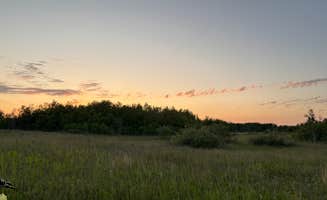Dispersed camping near Bottineau, North Dakota offers minimal options due to the region's predominantly agricultural landscape. Primitive camping near Bottineau sits in the Turtle Mountains area, which features a mix of deciduous forest patches among prairie lands. Winter temperatures frequently drop below zero degrees Fahrenheit, making seasonal planning crucial for backcountry camping experiences in this region.
What to do
Explore forest tree varieties: Denbigh Experimental Forest Dispersed allows visitors to examine various tree species planted as part of forestry research. "Seeing all the different kinds of trees planted in close range was very compelling. Beautifully maintained trails and a small network of unpaved roads," notes Emily S., who explored the area with her dogs.
Bird watching opportunities: School Section Lake Wildlife Refuge provides habitat for migratory birds and waterfowl. The restriction on pets, generators, and noise creates an undisturbed environment ideal for wildlife observation, though amenities are nonexistent.
Biking on forest trails: The unpaved roads in Denbigh Experimental Forest provide cycling opportunities in a natural setting. "I took a delightful bike ride with my dogs and we really enjoyed this location," shares one visitor who appreciated the maintained trail system.
What campers like
Free access: The cost-free nature of primitive camping locations makes them attractive to budget-conscious travelers. One camper at School Section Lake Wildlife Refuge appreciated the no-fee policy despite the significant restrictions on activities.
Limited traffic: Visitors seeking solitude find the low visitation rates beneficial. Macy S. points out about Denbigh, "Best part is it's free, there isn't much traffic, plenty of room. Pets allowed. Someone might be here to greet you, but probably not."
Self-sufficient camping: The absence of facilities forces complete self-reliance, which some backcountry enthusiasts prefer. All water, waste disposal, and supplies must be packed in and out at both locations.
What you should know
Seasonal hazards: Tick populations become problematic during warmer months at Denbigh Experimental Forest. "I loved this area... However, to say that we became infested with ticks is damn near an understatement. If ticks bother you, I do not recommend coming to this spot," warns Emily S.
Access limitations: Vegetation growth can impede entry to dispersed camping areas. Jenny P. reported difficulties at Denbigh: "Overgrown with dense two foot tall grass, could not find a place to park or even turn my little car around."
Strict regulations: School Section Lake enforces rules prohibiting alcohol, fires, pets, and generators. Visitors must pack out all trash and bring their own water, as no facilities exist on site.
Tips for camping with families
Pack extra water: With no drinking water available at either dispersed camping location near Bottineau, families must carry sufficient water for drinking, cooking, and basic hygiene for their entire stay.
Wildlife education opportunity: School Section Lake Wildlife Refuge offers chances to teach children about conservation and wildlife, though the strict prohibition on noise, pets, and fires requires advance preparation for keeping children engaged.
Plan for tick prevention: If visiting Denbigh during warmer months, bring appropriate clothing, repellents, and conduct regular tick checks on children and gear. Consider timing visits for cooler months when tick populations are less active.
Tips from RVers
Limited RV accessibility: Only Denbigh Experimental Forest accommodates RVs among dispersed camping options near Bottineau. The site is marked as big-rig friendly but lacks hookups or facilities.
Seasonal access concerns: RV campers should check road conditions before attempting access to Denbigh Experimental Forest, particularly after rain or during periods of vegetation overgrowth. Jenny P. notes difficulties even with a small vehicle: "I had to reroute my trip" due to access issues.
Self-contained requirement: RVers must be fully self-sufficient with onboard water, waste capacity, and power. No dump stations, water fills, or electrical hookups exist at these primitive camping locations.


